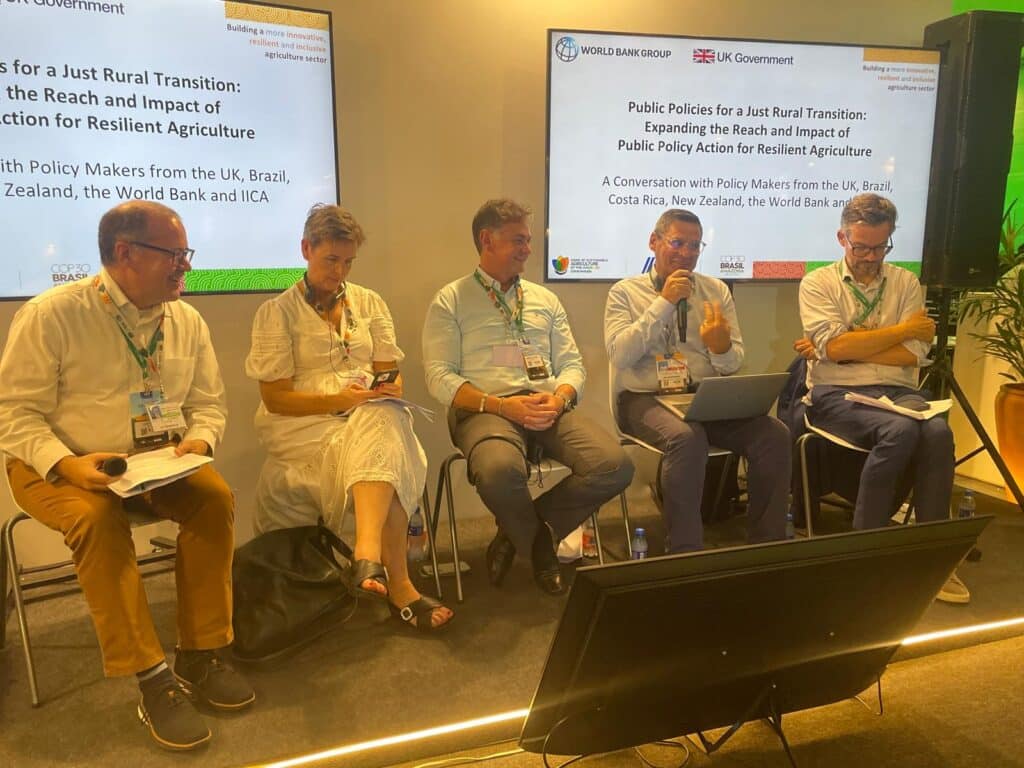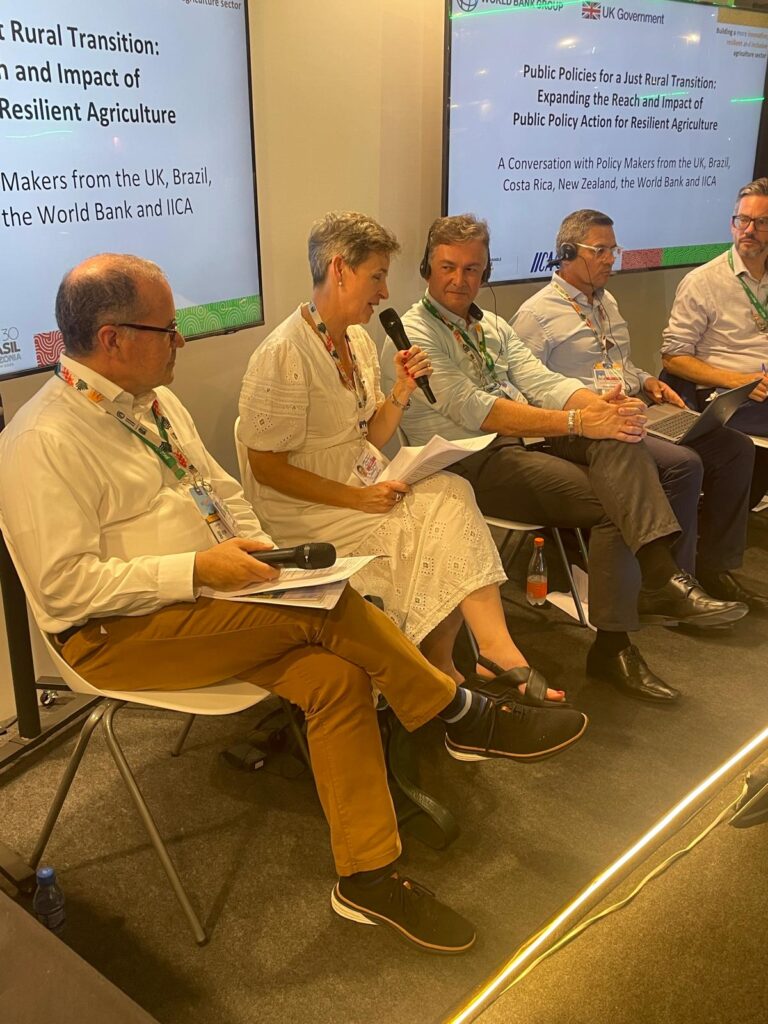
Lloyd Day, IICA Deputy Director General; Mary Creagh, Minister for Nature at the United Kingdom’s Department for Environment, Food and Rural Affairs; Marcelo Fiadeiro, Secretary of Rural Development at Brazil’s Ministry of Agriculture, Livestock and Supply; Fernando Vargas, Vice Minister of Agriculture and Livestock of Costa Rica; and Erwin De Nys, Manager for Environment and Social Operations for Latin America and the Caribbean at the World Bank.
Belém do Pará, Brazil, 25 November 2025 (IICA) – Governments from Latin American countries met with the United Kingdom and international organizations at the pavilion of the Inter-American Institute for Cooperation on Agriculture (IICA) at COP30 to share experiences and perspectives on the public policies they are implementing to promote resilient agriculture and a just rural transition.
The meeting marked the closing of two weeks of intensive and wide-ranging activities at the Home of Sustainable Agriculture of the Americas, the name once again given to the pavilion installed by IICA and its partners in the world’s largest environmental forum. Following previous editions in Egypt (2022), the United Arab Emirates (2023) and Azerbaijan (2024), the organization brought the voice of the continent’s agricultural sector to the COP held in the Brazilian Amazon.
The discussion covered success stories and lessons learned from policies designed to support agriculture adapted to increasingly extreme climate events, while improving opportunities for communities to enhance their living conditions. Participants also took a deep dive into the issue of incentives intended to promote agricultural transformation—which do not always produce the desired effects—as well as financing for sustainable production, an especially delicate challenge for developing countries.
Participants included Mary Creagh, Minister for Nature at the United Kingdom’s Department for Environment, Food and Rural Affairs (DEFRA); Marcelo Fiadeiro, Secretary of Rural Development at Brazil’s Ministry of Agriculture, Livestock and Supply (MAPA); Fernando Vargas, Vice Minister of Agriculture and Livestock of Costa Rica; Vanderley Zigler, Advisor at Brazil’s Ministry of Agrarian Development and Family Farming; and Erwin De Nys, Manager for Environment and Social Operations for Latin America and the Caribbean at the World Bank.
The discussion was moderated by Lloyd Day, IICA Deputy Director General.
Environment, agriculture and food systems
“It was a great decision by Brazil to bring this COP to the Amazon, the most valuable tropical forest in the world, where we can see and feel the effects of environmental degradation and climate challenges”, said Creagh.
“I’m delighted to be here at the Home of Sustainable Agriculture of the Americas, a space created to discuss how we are going to feed 10 billion people in 2050, in the context of an agriculture that is vulnerable to climate change but also generates impacts we need to mitigate, such as greenhouse gas emissions and contamination of freshwater sources”, she added.
Creagh—whose responsibilities in the UK government include promoting the circular economy, land-use planning, biodiversity protection and green finance—spoke about the meaning of agricultural transformation.
“Very often we see agricultural subsidies fail to achieve their intended objectives, or encourage misguided practices, such as expanding production into marginal areas. We need to change and shift toward incentives that respect nature, build resilience, and support carbon sequestration and traceability systems”, she stated. Creagh also highlighted the leadership examples of Brazil and Costa Rica, Latin American countries promoting sound public policies that simultaneously foster productivity and environmental restoration.
Fiadeiro and Zigler outlined the details of programs on sustainable agriculture and the restoration of degraded lands that Brazil has been implementing for years.
One of these initiatives is the ABC Plan, a public policy consisting of a set of actions aimed at increasing the use of sustainable agricultural technologies with high potential to mitigate greenhouse gas emissions. The plan supports initiatives that contribute significantly to the sustainable development of agricultural production systems, especially in rehabilitating degraded pastures and promoting integrated agrosilvopastoral systems.
They also described how the Agro+Sustentável platform works, which integrates official government data and market information to help producers meet the socio-environmental requirements of domestic and international markets.

The discussion included success stories and lessons learned from policies aimed at supporting agriculture adapted to increasingly extreme climate events, while expanding opportunities for communities to improve their living conditions.
No further agricultural expansion
“Costa Rica is a small country with strong environmental awareness”, said Fernando Vargas, who revealed to the audience that land-use change is no longer permitted in this Central American nation.
“Therefore, the agricultural frontier can no longer expand. Sixty percent of the country is under forest cover, and 35% of that area corresponds to protected areas. We are left with a small portion available for agriculture, so our only option is to be competitive and innovative”, he noted.
Vargas explained several pillars of Costa Rica’s agricultural planning, which include institutional modernization, competitiveness, productivity, sustainability, value addition and commercialization.
The Vice Minister also provided details on a pay-for-results program developed by Costa Rica with the World Bank, which is helping bring more professionals into rural areas to strengthen extension services and improve traceability in crops such as coffee and sugarcane.
Speaking on behalf of the World Bank, expert Erwin De Nys recalled that at COP28 in Dubai, 160 countries signed declarations committing to integrate agriculture and food into their national climate plans, but this has not guaranteed progress toward a just transformation and transition.
He noted that large amounts of money are being invested, yet results are not always as expected.
“The big question remains how to finance the transition. Each year, USD 800 billion is directed to agriculture, but 60% of that supports price distortions or production practices harmful to nature. For every dollar of public support, production increases by only 35 cents”, he stated.
To address these challenges, De Nys said, the World Bank is working on the AgriConnect program: “The mission is to rethink public policies and support programs that transform agrifood systems so they contribute to the triple objective of healthy people, healthy economies and a healthy planet”.
More information:
Institutional Communication Division.
comunicacion.institucional@iica.int











